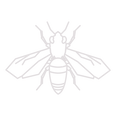Pest Profiles:
Bald Faced Hornets
BALD FACED HORNETS are some of the most aggressive wasps out there. They live in bushes and trees or outside of buildings.
They have an aggressively defensive nature, which makes them a threat to humans who wander too close to a nest or when a nest is constructed too close to human habitation. Bald Faced Hornets vigorously defend the nest, with workers stinging repeatedly, as is common among social bees and wasps.
CAUTION: Sprays venom in eyes
Bald Faced Hornets have a unique defense in that they can squirt or spray venom from the stinger into the eyes of vertebrate nest intruders (vertebrates are those creatures with spines). The venom causes immediate watering of the eyes and temporary blindness.
The Bald Faced Hornet gets its name from the characteristic white markings on its face. Its black and white coloring differentiates it from its mostly black and yellow genus mates. NOTE: Bald Faced Hornets are not really hornets. The only true species of hornet in the U.S. is the European hornet.
Bald Faced Hornets make their football shaped nests out of tiny bits of wood fiber from rotting wood, adding their saliva when they chew the material to make a paper-like pulp. The nest inside is made of horizontal combs. These wasps will attack if they feel threatened and are capable of repeatedly stinging their victims.
FAST FACTS: BALD FACED HORNETS
-
Identified by the white markings on their face, thorax, legs, and abdomen.
-
Measures 13mm (0.51 in.) to 20mm (0.79 in.) long; the queen is generally the largest.
-
Live in bushes, trees, and around buildings.
-
Repeatedly sting victims; stings are very painful.
WHAT'S MY NEXT STEP?
Contact Protek Pest Control, your local pest control service. Bald Faced Hornets can be a challenge to get rid of without getting stung. Their nests can grow to the size of three footballs and their stings are very painful. Protek Pest Control will safely and effectively remove bald faced hornets. Don’t try to do this yourself.
Bald Faced Hornets are aggressive so warn your family and neighbors about the nest and avoid the area. If you can do so safely, mark the nested tree or area with caution tape to remind everyone to be extra careful. Hornets are often attracted to porch lights. If they are becoming a nuisance, turn off your porch light and only use it when necessary.











